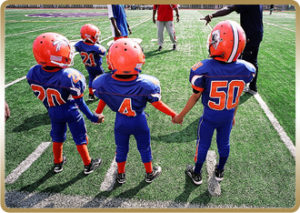 The Super Bowl looms large. If you read this after the 51st has been played your perspective may be vastly different than having read it before the big game, and . . . it’s not necessarily dependent on who won. Do you have a son or daughter in contact sports?
The Super Bowl looms large. If you read this after the 51st has been played your perspective may be vastly different than having read it before the big game, and . . . it’s not necessarily dependent on who won. Do you have a son or daughter in contact sports?
The controversy regarding the safety of playing sports that require intense physical interaction is forefront in the minds of many parents. SEO services Niagara sees the results of parents searching online for feedback regarding children and football and the results are clear. Three million children in the US play American style, tackle football. The game involves a lot of physical trauma and young kids don’t often notice how badly they abuse their bodies. Concussions occur despite the best regulation helmets. Head injuries can carry long-term effects. Studies show that even lesser hits to a developing brain can add up to trouble. Since a child’s brain is in its prime development stages between the ages of 9 years and 18, the organ is especially vulnerable.
Naturally, we want to see our kid shine in any endeavor he or she may take on, but to what expense? However, with recent studies showing that intense contact on a developing body can alter the future of that individual for a lifetime, perhaps parents should take a closer look.
Despite the research being done, there hasn’t been enough conclusive evidence to pull your child from the sport he loves. Often sports are the only way a struggling student can define himself. This needs to be changed and self-esteem must be re-aligned with self-worth as a person, not as a running back. This is unlikely to happen as long as our love of the game continues to run deep in mainstream America.
America’s fall and winter pastime is big business. It’s fun to watch and we all have the obsessive desire to be winners, so as toddlers we are inundated with the culture. We see the joy of winning and the agony of defeat on those around us. We begin to tap into the highs and lows and if we are remotely inclined to participate at a physical level, we are encouraged – in most homes, to do so.
After talking with a young mother of two boys who play, a different perspective emerges. Kindra-Ritzie-Worthy’s 13 and 11-year-old boys love the sport. They do well in school because otherwise they would be taken off the roster. Ritze-Worthy sees the motivation as worth the trade-off for any risks. Unless the data is conclusive this mother doesn’t want to take away football when she sees that it makes her boys happy and their grades are good. Reasonable?
Kids have been playing hard-core contact sports for decades. The number of long-term consequences are not yet well documented. Parents have to make tough calls at every turn, but when it comes to so many unknowns the job has to be even more challenging.
What would you do as a parent of a young athlete? Would you guide him towards, tennis, track & field, baseball, basketball, wrestling or fencing? Leave a comment below and tell us what your thoughts are regarding this very controversial subject.
Tags: brain trauma, concussion, contact sports, Little League, pee wee football